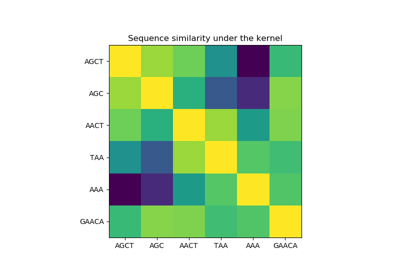sklearn.gaussian_process.kernels.Kernel¶
-
class
sklearn.gaussian_process.kernels.Kernel[source]¶ Base class for all kernels.
New in version 0.18.
- Attributes
boundsReturns the log-transformed bounds on the theta.
hyperparametersReturns a list of all hyperparameter specifications.
n_dimsReturns the number of non-fixed hyperparameters of the kernel.
requires_vector_inputReturns whether the kernel is defined on fixed-length feature vectors or generic objects.
thetaReturns the (flattened, log-transformed) non-fixed hyperparameters.
Methods
__call__(self, X[, Y, eval_gradient])Evaluate the kernel.
clone_with_theta(self, theta)Returns a clone of self with given hyperparameters theta.
diag(self, X)Returns the diagonal of the kernel k(X, X).
get_params(self[, deep])Get parameters of this kernel.
is_stationary(self)Returns whether the kernel is stationary.
set_params(self, \*\*params)Set the parameters of this kernel.
-
__init__(self, /, *args, **kwargs)¶ Initialize self. See help(type(self)) for accurate signature.
-
property
bounds¶ Returns the log-transformed bounds on the theta.
- Returns
- boundsarray, shape (n_dims, 2)
The log-transformed bounds on the kernel’s hyperparameters theta
-
clone_with_theta(self, theta)[source]¶ Returns a clone of self with given hyperparameters theta.
- Parameters
- thetaarray, shape (n_dims,)
The hyperparameters
-
abstract
diag(self, X)[source]¶ Returns the diagonal of the kernel k(X, X).
The result of this method is identical to np.diag(self(X)); however, it can be evaluated more efficiently since only the diagonal is evaluated.
- Parameters
- Xsequence of length n_samples
Left argument of the returned kernel k(X, Y)
- Returns
- K_diagarray, shape (n_samples_X,)
Diagonal of kernel k(X, X)
-
get_params(self, deep=True)[source]¶ Get parameters of this kernel.
- Parameters
- deepboolean, optional
If True, will return the parameters for this estimator and contained subobjects that are estimators.
- Returns
- paramsmapping of string to any
Parameter names mapped to their values.
-
property
hyperparameters¶ Returns a list of all hyperparameter specifications.
-
property
n_dims¶ Returns the number of non-fixed hyperparameters of the kernel.
-
property
requires_vector_input¶ Returns whether the kernel is defined on fixed-length feature vectors or generic objects. Defaults to True for backward compatibility.
-
set_params(self, **params)[source]¶ Set the parameters of this kernel.
The method works on simple kernels as well as on nested kernels. The latter have parameters of the form
<component>__<parameter>so that it’s possible to update each component of a nested object.- Returns
- self
-
property
theta¶ Returns the (flattened, log-transformed) non-fixed hyperparameters.
Note that theta are typically the log-transformed values of the kernel’s hyperparameters as this representation of the search space is more amenable for hyperparameter search, as hyperparameters like length-scales naturally live on a log-scale.
- Returns
- thetaarray, shape (n_dims,)
The non-fixed, log-transformed hyperparameters of the kernel

